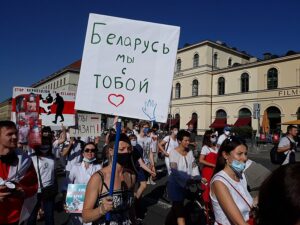Minds of the Movement
An ICNC blog on the people and power of civil resistance
by Maciej BartkowskiDecember 03, 2020
Click here to open A Democracy's Guide to Foiling Autocrats
(PDF also available)
It took more than a month of nonviolent pro-democracy protests by Belarusians—met consistently with vicious repression by the Lukashenko government—before some democratic countries selectively imposed sanctions on key perpetrators of the regime. Two months after the emergence of the national movement amid rigged elections and regime violence, the European Union, as a block, imposed sanctions on the top members of the Belarusian regime, adding to its sanction list its ruler Alexander Lukashenko a few days later.

Nonviolent march against dictatorship in Belarus. Munich, Germany, August 21, 2020. Source: Wikipedia/Henning Schlottmann (CC BY-SA 4.0, unedited).
In addition to sanctions on individuals (at a time of this writing entities enabling the regime were not yet sanctioned), a number of democracies also rejected the “official” election results (Lithuania went so far as to recognize opposition leader, Svetlana Tikhanovskaya, as the legitimate president), provided shelter to forcefully exiled Belarusian oppositionists—including Tikhanovskaya—and showed international solidarity by having diplomats visit the home of Nobel laureate Svetlana Alexievich, who subsequently fled Belarus.
Yet despite these efforts, it is hard to conclude that democratic countries were adequate in their bid to support democracy. With more preparation and political will, comprehensive sanctions against Belarus’s autocratic regime could have been put in place in a coordinated manner soon after the August 9, 2020 elections, which were predictably marred by major voting irregularities followed by brutal repression of protesters.
Instead, external support for the pro-democracy movement was often late, remained reactive to the actions of the regime, and relied on limited tools.
This case provides an important point of reference for considering how democracies can improve their repertoire of actions in support of people who are nonviolently fighting for human rights and democracy in their countries.
Currently, democracies lack a developed toolkit of steps and actions for supporting pro-democracy movements that they could routinely consult as part of their daily political, bureaucratic, and diplomatic work and deploy them rapidly when the need arises.

Female protesters joining the Belarusian peaceful protests. Source: @AliaksandraT's Twitter account.
If devised beforehand, a wide-ranging toolkit of actions will help democracies quickly operationalize and implement various initiatives supportive of people even prior to their mass mobilization against an autocrat and before they face predictable repression.
Without such an operational toolkit, democracies are left on the defensive when an authoritarian regime initiates a crackdown on its resisting population.
Democracies can and must do better in providing support and concrete assistance to pro-democracy movements and thus mitigate violence against unarmed people and, in the long run, help increase the chances of success for the pro-democracy resistance.
"A Democracy’s Guide to Foiling Autocrats: How Democratic States Can Effectively Support Pro-Democracy Movements" offers a curated and comprehensive list of tools for democracies and their representatives to conduct an effective assistance program to nonviolent pro-democracy movements.
Go to:
A Democracy’s Guide to Foiling Autocrats
(PDF also available)

Maciej Bartkowski
Dr. Maciej Bartkowski is a Senior Advisor to ICNC. He works on academic programs to support teaching, research and study on civil resistance. He is a series editor of the ICNC Monographs and ICNC Special Reports, and book editor of Recovering Nonviolent History. You can follow him @macbartkow